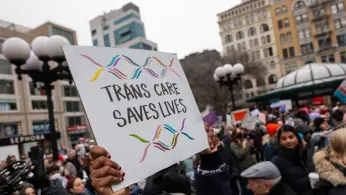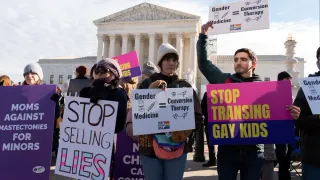
Jul 21
Children’s National Hospital Halts Gender-Affirming Care for Transgender Youth Amid Political Pressure
READ TIME: 3 MIN.
Children’s National Hospital, a prominent pediatric institution in Washington, D.C., has announced it is pausing puberty blockers and hormone therapy for transgender youth, citing compliance with a recent executive order from President Donald Trump. The hospital’s decision comes amid rapidly shifting federal policy on LGBTQ+ health care, and has raised urgent concerns about the well-being of transgender young people and their families .
On January 28, President Trump signed an executive order directing federal agencies to ensure that hospitals receiving federal funding discontinue gender-affirming care for individuals under age 19. The order prohibits support for care such as puberty blockers, hormone therapy, and surgical procedures for transgender and gender nonconforming youth, declaring that federal funds should not support what it terms “chemical and surgical mutilation” of children . The move marks a reversal of previous policies intended to safeguard access to gender-affirming care for transgender Americans.
In response, Children’s National Hospital released a statement emphasizing its commitment to compassionate care while complying with the law: “As a result, we are currently pausing all puberty blockers and hormone therapy prescriptions for transgender youth patients, per the guidelines in the executive order issued by the White House this week. Children’s National already does not perform gender affirming surgery for minors” .
The hospital’s decision is part of a broader wave of changes affecting families and transgender youth across the United States. Other major institutions, including Children’s Hospital Los Angeles, Denver Health, and Children’s Hospital of Richmond, have also suspended gender-affirming care for those under 19 as they evaluate the implications of the executive order . Lurie Children’s Hospital of Chicago reported that it is currently reviewing the order and assessing its potential impact .
The announcement has met with alarm from LGBTQ+ advocates, health care providers, and families, many of whom warn of the risks posed to transgender youth who rely on gender-affirming care as a medically recognized, evidence-based treatment for gender dysphoria. Families have expressed concern about the potential interruption of care and the uncertainty facing their children’s health and well-being .
Children’s National Hospital noted in its statement that while gender-affirming surgeries were not offered to minors, it will continue to provide mental health counseling, social support, and holistic services to all patients. “We will do everything we can to ensure the same uninterrupted access to mental health counseling, social support, and holistic and respectful care for every patient at Children’s National. We are working directly with patients and providers to ensure every patient has access to the information and support services they need, and we appreciate their continued trust and understanding as we work through these changes,” the hospital stated .
The executive order and subsequent suspension of care have sparked protests and legal challenges. Advocacy groups argue that restricting gender-affirming care for youth is not only medically unsound but also endangers the mental health and safety of transgender people, who already face disproportionate rates of discrimination, self-harm, and suicide .
Medical organizations, including the American Academy of Pediatrics and the American Medical Association, have previously affirmed that gender-affirming care is medically necessary and lifesaving for many transgender youth. Critics of the executive order highlight that the move is politically motivated and undermines established standards of medical care .
As legal advocacy efforts develop and hospitals navigate the new federal landscape, families and young people are left in limbo. Some hospitals are seeking legal guidance as they weigh whether to resume care or challenge the order in court. Meanwhile, community organizations have increased outreach and support services to address the needs of affected youth.
As of this writing, Children’s National Hospital and other major pediatric centers have not indicated when or if gender-affirming medical care for youth might resume. The situation remains fluid, with ongoing legal and policy challenges expected in the weeks and months ahead.
Advocates emphasize the importance of continued support for transgender youth during this period of uncertainty, urging policymakers to prioritize the health, dignity, and autonomy of all young people.






